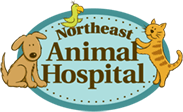Responsible Pet Adoption in the Time of COVID-19
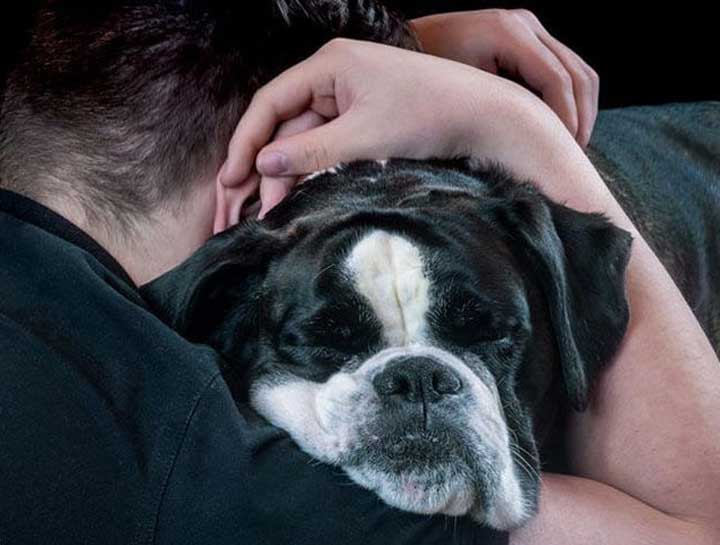
We are encouraged that officials are now so focused on efforts to gradually return our communities to normal after the threat of COVID-19 has passed. Sadly though, many people still find themselves isolated, furloughed, or without a job right now; and their time at home is spent in anxious worry.
At the same time, animal shelters across the country are seeing an increase in the number of pet adoptions. Some shelters have even found themselves without pets for people to adopt. There is a clear, yet poignant, connection between people who must stay at home and the increase in pet adoptions:
As many are now spending a greater amount of time at home—away from family, friends, and workmates—the comforting companionship of a pet is especially appealing. People who have never been able to own a pet before, either because of their work schedule or because they travel often, now find that they have time to welcome a pet into their home.
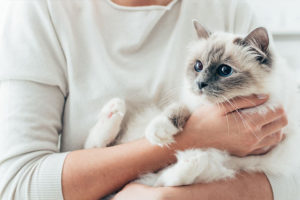
Those who have never been able to own a pet before because of their work schedule, or because of the amount they travel, are now finding they have the time to adopt a pet.
What are the benefits of pet adoption?
You may agree with many who view the higher number of pets being adopted as a good thing to come out of this pandemic. After all, pets are finding homes, and socially isolated pet owners receive emotional support and feel less stress when they are around their pets.
The benefits of owning a pet are indeed clinically measurable. Pets can help lower your blood pressure and cortisol levels, and ease feelings of depression and anxiety. In addition, having someone who depends on you is a great reason to get out of bed in the morning!
The surge of new pet adoptions is bringing definite benefits to pet owners who are staying “safer at home.” However, questions arise: What happens to our new pets when we have to go back to work? What responsibility do we have to ensure our pets’ continued well-being? With National Adopt a Pet Month just around the corner, we would like to offer some guidance if you are considering welcoming an adopted pet into your life.

Many feel the effects of isolation due to the social distancing we are required to follow to help stop the spread of COVID-19. Sharing your love with a pet may help ease those feelings if you adopt responsibly.
What should I consider before adopting a pet?
If you have ever felt that you don’t have the time to train a new dog or to house-train a new kitten, now may be a great time to own a pet. However, if you expect to return to work or school full-time, consider your plans before adopting. If you live in a condo, and you currently have the time to take your boxer-mix rescue on three long walks a day, how will he fare when he only gets a quick walk in the morning and then again when you get home?

If you’ve never felt that you had the time to train a new dog or house-train a new kitten, now may be a great time to adopt a new pet.
Such factors as the size of your home, whether there are other family members (including children or other pets), the amount of time you are away from home, and your energy level, are some of the many things that you should weigh carefully and realistically when thinking about adoption.
But also remember that you have options for pet care assistance while you’re away from home. For example, doggy daycare may be something to consider at such a time when you have to return to a full-time schedule away from home.

Adopting a dog now, and then returning to a full schedule of work or school, may leave your pet alone at home all day. Take this into consideration when adopting. Doggy day care may be a solution to this problem.
Am I compatible with the pet I want to adopt?
Years ago, we published a blog post on responsible pet adoption that featured my own experience of realizing that adoption wasn’t the right thing for my family or the puppy. Here is my story in part:
I remember my first days at Northeast Animal Hospital. I was working as a Pet Care Coordinator and my favorite part of my job was welcoming all the adorable new puppies that came in! One Saturday, soon after Hurricane Katrina devastated parts of southern Louisiana and Mississippi, a client came in with a beagle puppy that was a hurricane rescue. We were looking to adopt a dog ourselves at that time, so after work, I beat a path over to the rescue center. They had one puppy left! I took her into a meet-and-greet room at the shelter and quickly fell in love with her! I started all the preliminary paperwork as “Grace” (as I had already named her) fell asleep in my arms. Her long silky ears draped into my lap and I couldn’t believe how things had just seemed to fall into place that day. Then the shelter worker asked me if I was familiar with the breed.
“Well, no, actually I’m not.” She handed me a book on the breed and went on to help another family.
“Sweet, loving, and gentle…” the book said.
“So far so good,” I thought.
“Beagles do have a mind of their own and need firm, consistent, and patient training.”
“Hmmm… I’m not so good with dog training.”
“Prone to separation anxiety, they can be destructive and bark excessively when left alone for long periods.”
“Well, surely this can be said of any breed,” I argued with myself.
“Beagles have a howling bark and are natural diggers. Make sure you have an inescapable fenced-in yard.” I sighed and looked down at Grace.
Our fence was a wooden one that would have been all too easy for a dog to dig under and run away. Besides that, both my husband and I worked, so we wouldn’t have been home to provide Grace any companionship during the day. I just pictured our little puppy howling for us for hours, annoying our neighbors.
Reluctantly, I came to the realization: We were not a good fit for her. My heart sank. A lump formed in my throat.
The worker came back and sat across from me. She said, “Well, are you ready for some more paperwork?”
I closed the book and stroked Grace’s ear. I told her I was very sorry, but that I didn’t think that we were beagle people after all. She assured me there was no reason to apologize and that she was glad I had come to that conclusion now, instead of three months later feeling we had no choice but to return the puppy to them. I said my goodbyes to Grace and left empty-handed.
On my drive back home I was a little sad but mostly proud of myself. I was glad that I didn’t make an emotional decision, but a responsible one that was best for everyone, especially the puppy. We did eventually adopt a puppy. Chloe, our little Chihuahua mix, is absolutely the best little dog for us, and we are for her.

Walking away from “Grace” was very hard, but I was proud of myself for not making an emotional decision. I did what was best for everyone, especially the puppy.
What does responsible pet adoption mean for me?
If you decide that adoption won’t work out for you in the long run, does that mean you’re doomed to spend your time in isolation without a four-legged companion? Not at all! Fostering can be a great compromise! You get to help an animal in need, enjoy the fun and good company a pet brings, and not be committed to pet ownership. According to the Humane Society, foster rates have increased by 90 percent in some cities in recent weeks.

You can give a pet a much needed foster home—while you are home—and everyone benefits. You have a loving companion, the shelter is free to receive more surrendered pets, and pets who are fostered have an easier time transitioning into a permanent home than if they are adopted from a shelter facility.
While some shelters are happily empty, others find themselves with an increase of pets being surrendered because their owners lose their jobs or become too ill to care for them. (See our blog on staying home with your pet for ideas on preparing an emergency plan for your pet should you become ill.) Many shelters are offering free adoptions to help ease the financial strain on those who may already be struggling economically due to the COVID-19 outbreak.
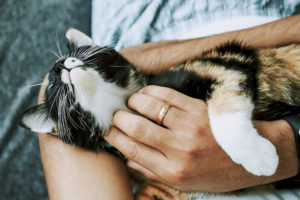
Many shelters are offering free adoptions to help ease the strain that those who are struggling economically because of the COVID-19 outbreak may be feeling. Photo credit: Fuzzy Rescue
Whether you’re adopting or fostering, having a pet can help you stick to good routines, or establish new healthy habits, like exercise and getting outdoors. Walking your dog with your partner or family members can be a good distraction from the negative aspects of life and can build your bond with each other.
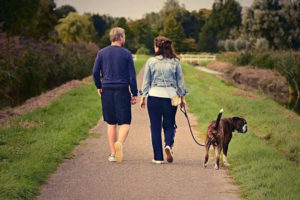
Having a pet can help you maintain a good routine or to establish new healthy habits, like exercise and getting outdoors.
Working together, we can make a difference in the lives of pets—and each other—through adoption, fostering, and community-building. Pets can be a bridge between isolation and connection. Make the best of sheltering at home by making your home a shelter for pets in need!
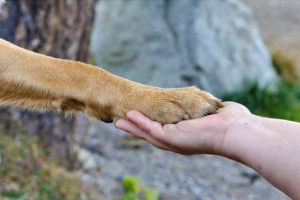
A pet can be a bridge between isolation and connection.
For extra peace of mind during this time, we have extended our Exams For Rescues offer. Previously, the offer of a free exam for rescues was valid only within two weeks of adoption. Now, we are extending the offer to all pets that are adopted between March 1, 2020, until we reopen our office for wellness visits. Just one more way we are devoted to pets and their people!
